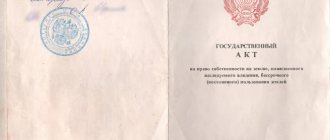G. Alekseev Author of the article
According to modern legislation, the right of ownership of any property is the most complete in content, since it includes the right of ownership, as well as use and disposal. Their implementation, as well as other actions in relation to land plots, are described in the current Civil and Land Codes, as well as in other regulatory documents.
The right of ownership of land means the ability of its owner to freely dispose of property without causing harm to third parties and the environment (based on clause 3 of Article 209 of the Civil Code). However, the ownership of such real estate raises many questions related to the characteristic features of use and disposal. For example, one of the most common and difficult situations is the transfer of ownership of a land plot.
In this article we talk about typical options for resolving legal issues, but each case is unique. Take advantage of a free consultation specifically for your specific case, call right now by phone: (it’s free) +7 Moscow +7 St. Petersburg +7 ext. 636 - 24-hour toll-free line throughout Russia
This is a transaction according to which property passes from the owner to the acquirer. Moreover, when it comes to real estate property, ownership of it begins from the date of state registration of the transfer (Article 131 of the Civil Code).
Grounds for transfer of ownership of a plot
A change of owner is possible for a number of reasons. According to Art. 25 of the Land Code, rights to plots arise on the grounds specified by civil legislation and federal laws and must be registered if required by law.
The most common reasons for transfer of ownership are:
- transactions of purchase and sale, donation, exchange or alienation on other grounds (Article 218 of the Civil Code);
- inheritance or succession during the reorganization of enterprises (Article 218 of the Civil Code);
- privatization of state or municipal plots (Article 217 of the Civil Code). A special case is the privatization of land under an apartment building;
- in paragraph 3 of Art. 218 of the Civil Code specifies a number of other grounds, for example, the acquisition of a plot that the owner abandoned or for some reason lost the right of ownership.
In addition, Articles 17, 18, 19 of the Land Code contain information about the possibility of transferring ownership of land to the Russian Federation, its constituent entities and municipal bodies. In each of these cases, the transaction has its own distinctive features.
Document certifying the transfer of rights
The paper confirming the transfer of rights to the new owner may be:
- agreement between the parties;
- application for acceptance of inheritance;
- testamentary disposition;
- the court's decision.
To formalize the transfer of rights, you will also need papers for the plot itself:
- certificate of ownership (now its role is played by an extract from the Unified State Register of Real Estate);
- the document on the basis of which the ownership right arose (inheritance certificate, purchase and sale agreement, donation, court decision);
- boundary plan;
- act of acceptance and transfer of land to the new owner.
Purchase and sale transaction
The transfer of ownership of a land plot under a purchase and sale agreement is the most common option for the alienation of real estate. This transaction, according to Art. 551 of the Civil Code, is subject to state registration, the procedure of which is regulated by Federal Law No. 221. It is from the moment of registration that the acquirer of the plot will have ownership rights. It is important to note that the purchase and sale agreement itself does not require registration; it is considered concluded after it is signed by all participants. The main points regarding the purchase and sale of land plots are described in Art. 37 of the Land Code, as well as in the Civil Code:
- The object of a purchase and sale transaction can only be those plots that have undergone cadastral registration. They have their own unique number, which makes it possible to identify the property in Rosreestr, and the purchase and sale agreement must contain information about the location, area, permitted use and other characteristics of the site. Those plots that are withdrawn from circulation are not subject to registration and cannot become the object of a transaction (they are listed in clause 4 of Article 27 of the Land Code);
- Some terms of the contract are considered invalid in advance. This is the seller’s opportunity to purchase the plot at his own request, various restrictions on the use of the plot, for example, leasing (clause 2 of Article 37 of the Land Code);
- The seller must not provide the buyer with knowingly false information about encumbrances on the plot, restrictions in connection with permitted use, and similar information that does not correspond to reality.
- Participants in the transaction are prohibited from changing the intended purpose of the site and the conditions of its use at their discretion.
As for the contract, it must certainly be written (Article 550 of the Civil Code). It is necessary to indicate the details of the participants, detailed information about the object of the transaction, as well as the following information: deadline for transfer of the plot, price, terms of payment and transfer of property.
Transfer of ownership of a plot with existing real estate objects
Often, transactions for the sale of land plots are complicated by the fact that there are various buildings on them. According to the law, land and these buildings are considered independent objects of law, between which there is a legally approved connection. In this case, the plot and the real estate on it can belong to either one person or a number of persons.
For example, the owner of a plot of land has the right to allow other persons to carry out construction on it without losing ownership of the territory being built, but without being the owner of the erected structures. The developer, in turn, can use part of the land provided for buildings (clause 1 of Article 271 of the Civil Code), but the lack of ownership of the site does not limit him to a similar right to the building.
How does the transfer of ownership of the land under the building occur in such situations? The answer to this difficult question is indicated in Art. 35 of the Land Code, which affirms the so-called principle of the unity of fate of the allotment and the buildings erected on it.
- By purchasing a building located on someone else’s site, the buyer also receives ownership of the territory occupied by the building, in the same volumes and on the same terms as the previous owner had (for example, maintaining the terms of the lease). In this case, the consent of the owner of the plot is not required for the transaction, unless otherwise stated in the land use agreement.
- The owner of buildings has a pre-emptive right to purchase or lease a plot of land.
- If the land and building are owned by one person, then the transfer of ownership of the buildings is possible only with the transfer of ownership of the plot occupied by them. Exceptions are specified in paragraph 4 of Art. 35 ZK. This is an easement, withdrawal of land from circulation and the impossibility of allocating part of the building in kind along with part of the land.
- Alienation of a land plot without buildings is not allowed if they belong to one person.
Inheritance of land plots
The transfer of ownership of a land plot by inheritance is regulated by civil, family and inheritance legislation and is a unilateral transaction that reflects the will of the testator. It must be recorded in the will and notarized. If such a document does not remain after the death of the owner of the property, then inheritance will take place according to the law (Article 1111 of the Civil Code).
The heirs are usually citizens, but the testator can indicate in the will a legal entity (Article 1116 of the Civil Code), as well as the Russian Federation, its constituent entities, municipalities, other countries and international organizations.
The heirs are divided into seven lines (Articles 1142 - 1145 of the Civil Code), and each subsequent line is called upon to inherit if there are no heirs of the previous line, they refused the inheritance or were deprived of it.
Citizens entering into an inheritance must ask a notary's office for a certificate of right to the inherited land plot (Article 1153 of the Civil Code). It is necessary to register the completed transfer of ownership of real estate. The allotment transferred to the heirs, which belongs to the previous owner as a property, and the right of lifelong inheritable ownership are inherited on a general basis (Article 1181 of the Civil Code).
If there are several heirs and the land passes to them under the right of common ownership, division of property is possible only taking into account the minimum size of the plot established for the territories of the corresponding intended purpose. If the property cannot be divided, it will go to the heir who has priority over the inheritance share, and everyone else will receive compensation. When all heirs do not have a preemptive right, the plot will go to them on the basis of shared ownership.
Re-registration of rights to previously provided land plots
Until now, many gardeners and summer residents have not re-registered ownership of their land plots that belong to them under the right of use.
The right to permanent (indefinite) use of a land plot can be re-registered as ownership, provided that the land plot was provided before the entry into force of the Land Code of the Russian Federation (October 30, 2001) for running personal subsidiary plots, dacha farming, vegetable gardening, horticulture, individual garage or individual housing construction. There are no restrictions on the renewal period.
The ownership of such plots can also be registered by citizens to whom the ownership of the buildings (structures) located on them has been transferred by inheritance or on other grounds. Please note: it is impossible to re-register those land plots that cannot be provided as private property, for example, due to their limited circulation.
The provision of land plots to citizens on the right of permanent (indefinite) use after October 30, 2001 is not provided for (clause
2 tbsp. 39.9LK RF).
To re-register the right of permanent (perpetual) use of a land plot into ownership, the following documents will be required: 1) an act on the provision of a land plot to a citizen, issued by a state authority or local government body; 2) a certificate of a citizen’s right to a land plot, issued by an authorized government body; 3) an extract from the household register indicating that a citizen has the right to a land plot (if the plot is provided for personal farming), issued by a local government body; 4) another document establishing or certifying the right to a land plot. If ownership of a building (structure, structure) located on a plot has been transferred to a citizen, the state registration of ownership of the land plot will require the following documents: 1) one of the documents listed above and establishing or certifying the right of the citizen - any previous owner of the specified building ( buildings, structures) on this land plot; 2) a certificate of inheritance or another document establishing or certifying a citizen’s ownership of a building (structure, structure) located on the site.
The second document from this list will not be required if the citizen’s ownership of the specified building (structure, structure) is registered in the Unified State Register of Real Estate. To state registration of ownership of a land plot, you must contact the territorial office of Rosreestr.
The application and documents can be submitted in the following ways: - directly to the Rosreestr branch (except for Moscow and the Moscow region) or through the MFC (regardless of the location of the property according to the list of departments that accept the extraterritorial principle posted on the Rosreestr website); — by postal item with a declared value upon forwarding, an inventory of the contents and a notification of delivery; - in the form of electronic documents via the Internet, for example through the official website of Rosreestr. The amount of the state duty for state registration of an individual’s ownership of a land plot in this case is 350 rubles.
The period for state registration of ownership of a land plot is no more than seven working days from the date of receipt of the application and documents by Rosreestr, and in the case of submitting the application and documents through the MFC - nine working days. The completed state registration is certified by an extract from the Unified State Register of Real Estate.
From the moment of state registration of a citizen’s ownership of a land plot, the right of permanent (indefinite) use of it is terminated.
Privatization of land plots
Allotments that are state or municipal property may be privatized or leased (Article 39.1 of the Land Code). In certain situations, this can even be done for free.
Plots are sold at auction or without them in the cases provided for in paragraph 2 of Art. 39.3 of the Land Code, and the price is determined during the auction or by local government or state authorities in the case of a sale without bidding.
The possibilities for free provision of plots are described in Art. 39.5 ZK. For example, citizens with whom an agreement on the development of the territory where their plot is located can count on this. Religious organizations that have buildings relevant to their activities can also receive land for them free of charge. The same benefit is provided to citizens who have owned land for free use for at least five years and have disposed of it in accordance with the established permitted use. Large families with three or more children receive a plot of land free of charge in accordance with the procedure approved by the authorities of the constituent entities of the Russian Federation.
How to transfer a plot of land to another person?
It will be possible to re-register a land plot to another person if there is a transfer of powers. The grounds may be temporary or permanent. To carry out these actions, you will need to conclude a civil law transaction or use an administrative procedure. It involves contacting municipal authorities.
2021 indicates that land plots in relation to land may be established by ownership rights or on other grounds reflected in the legislation. In particular, if it is leased or is for lifelong use, etc.
The form of ownership affects what conditions for the transfer of powers will apply in a particular situation.









